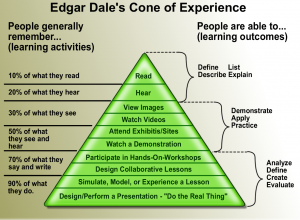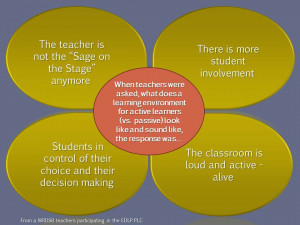By: Shekerah Primus To teach effectively, you must use Active Learning techniques. This was the main point I learned during the iJOBS sponsored Effective Teaching Techniques workshop, which was conducted by Dr. Diana Glendinning, a highly popular professor in the Neuroscience and Cell Biology department here at Rutgers. Active learning flips the traditional style of learning. In traditional classrooms, learning is passive; the professor uses the majority of classroom time to teach information by lecturing. In contrast, an active learning classroom requires students to study materials before the class, while classroom time is primarily used for problem-solving and application of the information learned via the study materials. Therefore, in active learning classrooms students learn by doing an activity.  Research shows that active learning is more effective because this method facilitates the learning process. Learning is constructed through the creation of a mental model; therefore, the more activity that goes into the creation of that model, the clearer it will be. This also explains why learning is improved by students learning together—Cooperative Learning—which involves students discussing the material and teaching each other. Since the active learning technique flips the traditional style of learning, classrooms that use this method are known as Flipped classrooms. Components of a Flipped Classroom:
Research shows that active learning is more effective because this method facilitates the learning process. Learning is constructed through the creation of a mental model; therefore, the more activity that goes into the creation of that model, the clearer it will be. This also explains why learning is improved by students learning together—Cooperative Learning—which involves students discussing the material and teaching each other. Since the active learning technique flips the traditional style of learning, classrooms that use this method are known as Flipped classrooms. Components of a Flipped Classroom:
- Preparation
- Pre-test readiness
- In-class problem-solving with facilitation
- Integration/resolution
- Feedback
Preparation: This component refers to the instructor’s role preparing study materials for students, as well as the student’s role in studying the material at home to prepare for in-class activities. It is very important for the instructor to prepare materials that are clear enough for students to grasp, and to be available before class if students have questions regarding the material. Study materials should be multimedia; a mixture of text, audio, video and interactive content ensures that different learning modes are facilitated. It is also important for students to prepare well, as pre-class readiness will be tested before the in-class activity. Pre-test readiness: This component is meant to ensure that students prepare for class. Readiness Assurance Tests (RAT) are given before the in-class activity. Readiness assurance tests should be individual (iRAT) and team-based (tRAT). Using both forms of RAT ensures that students who are less well-prepared benefit from the discussion that occurs during the team-based test. The iRAT and tRAT should be graded. In-class problem-solving with facilitation: The in-class activity helps to shape the nascent mental models that students construct as their understanding of the material grows. Therefore, it is very important for instructors to create challenging activities that will support and test students’ models. Choose clinically important cases or questions that are relevant to real-world activities. It is also very important for the instructor to understand their role as a facilitator: build a non-threatening learning environment, spend more time listening and observing than talking, and try not to answer questions; instead, guide students by asking questions that synthesize discussion.  Integration/resolution & feedback (on the learning process): This component is very important as it is a way for instructors to ensure that students understood the main take-home points of the lesson. Instructors should always save some time before the end of class for feedback, to resolve any problems, and to clarify concepts that remain unclear. If necessary, do a mini-lecture to wrap-up main points. This step acts as a validation of the mental model that students have created. Additionally, the instructor receives immediate feedback to gauge the success of the activity and can begin making changes if necessary. To give us the active learning experience, Dr Glendinning prepared a group exercise to simulate the Team-Based Learning (TBL) technique. First, we were put into groups. To ensure diversity in each group, we were divided based on our fields of expertise. You want to have diverse groups, never allow students to just work with their friends! Next, she gave us some time to read the material—this is typically the preparation that students would do at home. Then we took the iRAT and tRAT, followed by the team activity, which consisted of a set of real-world cases. We used the reading material to discuss and solve these problems. I must say that the discussion during the tRAT and problem-solving activity highlighted our diverse thinking styles and helped me build a better mental model. Other flipped classrooms include:
Integration/resolution & feedback (on the learning process): This component is very important as it is a way for instructors to ensure that students understood the main take-home points of the lesson. Instructors should always save some time before the end of class for feedback, to resolve any problems, and to clarify concepts that remain unclear. If necessary, do a mini-lecture to wrap-up main points. This step acts as a validation of the mental model that students have created. Additionally, the instructor receives immediate feedback to gauge the success of the activity and can begin making changes if necessary. To give us the active learning experience, Dr Glendinning prepared a group exercise to simulate the Team-Based Learning (TBL) technique. First, we were put into groups. To ensure diversity in each group, we were divided based on our fields of expertise. You want to have diverse groups, never allow students to just work with their friends! Next, she gave us some time to read the material—this is typically the preparation that students would do at home. Then we took the iRAT and tRAT, followed by the team activity, which consisted of a set of real-world cases. We used the reading material to discuss and solve these problems. I must say that the discussion during the tRAT and problem-solving activity highlighted our diverse thinking styles and helped me build a better mental model. Other flipped classrooms include:
- The Jigsaw— this technique is geared toward small groups and puts emphasis on peer teaching.
- Problem-based learning – a case-based learning style that is also geared toward small groups. Students study real cases. This style is used extensively in medical training.
- Just-in-Time Teaching (JiTT) – this style is geared toward large groups. It uses feedback from students based on activities done between classroom meetings. The instructor uses this feedback as a guide to focus subsequent classroom meetings particularly on areas of misunderstanding.
Through my experience, I realized that active learning helps in developing other essential skills by providing opportunities for students to practice good communication, accountability, and teamwork skills. In addition, it offers the benefit of sharpening the life-long learning skills of reasoning, synthesis, and the application of learned concepts. This article was edited by: Jennifer Casiano, Deepshikha Mishra & Monal Mehta